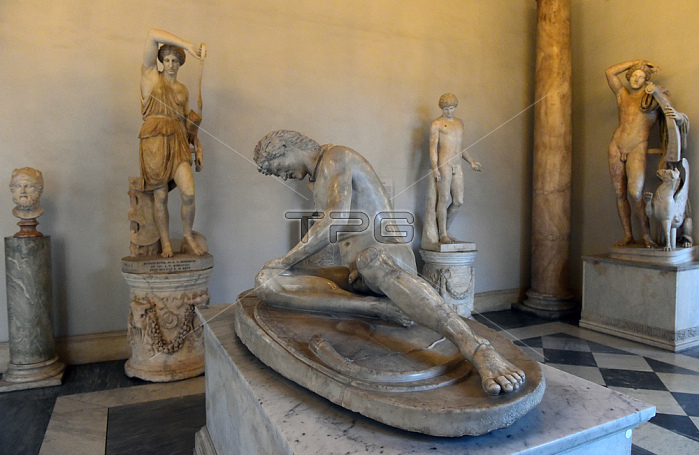
THE CAPITOLINE MUSEUMS (Musei Capitolini) IN ROME; ITALY. The creation of the Capitoline Museums has been traced back to 1471; when Pope Sixtus IV donated a group of bronze statues of great symbolic value to the People of Rome. The collections are closely linked to the city of Rome; and most of the exhibits come from the city itself.STATUE OF CAPITOLINE GAUL : THE DYING GALATIANSculpture From a Pergamene originalMarble cm 93The so-called 'DYING GALATIAN' is a replica of one of the sculptures in the ex-voto group dedicated to Pergamon by Attalus I to commemorate the victories over the Galatians in the III and II centuries BC.The sculpture; reproduced several times in engravings and drawings; is perhaps the most famous sculpture of the entire collection. In 1734; the statue was acquired from the Ludovisi Sculpture Collection. Probably the Ludovisi family found the statue on the premises of their villa. The Villa Ludovisi was situated on the ancient horti of Caesar; which through inheritance then passed into the possession of the historian Sallustius. With great pathos the statue depicts a wounded Gaul (Galatian). His attributes are very evident: shield; torques around his neck; complete nudity; disorered locks of hair and moustache. The very visible wound indicates the sculptor's intention to depict the warrior in the last moment of resistance to his pain. Perhaps the image pertains to the great donation created during the era of Pergamon that Attalus placed along the terrace of the Temple of Athena Nikephoros in order to celebrate his victories over the Galatians.
| px | px | dpi | = | cm | x | cm | = | MB |
Details
Creative#:
TOP20214335
Source:
達志影像
Authorization Type:
RM
Release Information:
須由TPG 完整授權
Model Release:
No
Property Release:
No
Right to Privacy:
No
Same folder images:

 Loading
Loading